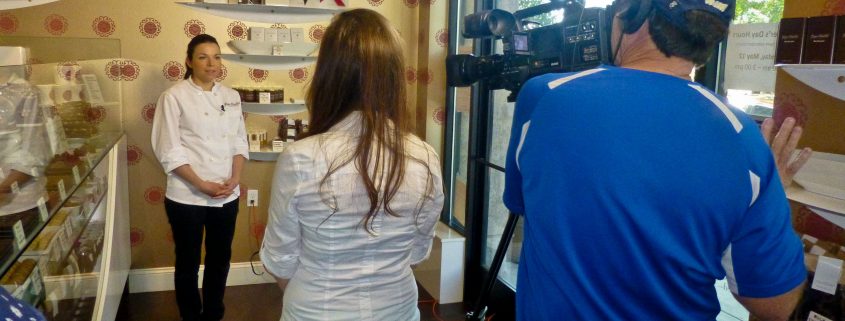Are you new to being on camera? Not to worry – not everyone is born with TV savvy. Even if you are not destined to become “an overnight success” on television, here s a crash course in how to appear professional on television or video.
Whether you are a salesperson, business owner, speaker or even a CEO, you will benefit from the following information. Remember, you will need to be prepared physically, mentally, and technologically. You should know how to turn on your audience before you turn on the camera.
Let’s Get Physical
Get lean. Video makes you look a couple pounds heavier. You’ll want to wear light and comfortable clothing – preferably classic styles. Don’t forget to breath normally, if you find yourself trying to read your complete script in one breath, relax – breathe normally – there’s no need to rush.
Be Mentally Prepared
Arrive early to familiarize yourself with the surroundings. Find a place to relax and gather your thoughts. If there is no ready room to keep you calm, create one in your mind. Check your attitude – accept that things can and do go wrong. Machines sometimes break and humans do make mistakes. Whatever happens, stay calm and go with the flow. The show will go on.
Use the Technology
Plan ahead of time. Discuss any props or visual aides you’d like to use with the producer or director in advance. Don’t show up and say, “By the way, I have a chart and some props.”
The lighting on set can be bright and direct. Practice keeping your head slightly tilted up while not squinting. A professional lighting director will put you in your best light, literally. Don‘t rock or swivel in your chair or wander too far around the stage. Know your mark and stay on it.
Rehearse your presentation, and if possible use a Teleprompter. Project your voice, in a steady volume. Talk at a comfortable volume. The audio engineer will monitor and adjust the recording levels. Avoid drastic volume changes such as whispering or shouting.
Repeat questions or incorporate questions into answers. For example, if someone asks, “How old are you?” don’t say, “35”, say, “I am 35 years old.” Speak clearly in complete thoughts; you will sound smarter and less likely be taken out of context.
During interviews, ignore the cameras. It is inappropriate to look directly into the lens unless you are asked to speak directly to the viewing audience. Pause before answering. Maintain normal eye contact and a conversational speaking style.
If there is a live audience, treat the camera as a bystander or just another audience member. Share your eye contact and attention accordingly. While making important points, consider employing a technique used by professional comedians. They deliver the set-up to the audience and the punch line into the camera.
Know your Audience
Prior to the start of the program, go warm up your audience. Explain what will be happening during the recording. Remind them to remain attentive and responsive. Suggest appropriate attire depending on your topic and needs. Have the audience arrive early to get used to seeing equipment and crew movement.
Rehearse your audience involvement unless it might destroy the spontaneity. If the audience will ask questions or participate, practice using a hand-held microphone.
Don’t forget to have audience members sign release forms giving written permission for their image to be used. There are generic release forms that you can customize for your usage.
When delivering messages directly into the lens, smile and be friendly with the camera. Weather using a Teleprompter, cue cards or memory, imagine you are talking to a relative, co-worker or friend. Communicating with one person will make each member of your audience feel like you are talking only to him or her. This intimacy is the power of television. Use home video or a mirror to practice eye contact, body language and vocal quality. Play it back, observing gestures and listening for pitch, pace and volume. Work on developing a commanding presence while appearing and sounding natural.
In summary, prepare yourself both physically and mentally. Work with the technology until you can act as if it’s not even there. And respect your audience. The greatest performers in any arena are often dedicated professionals who work very hard behind the scenes to make it look easy. With preparation, practice and persistence, you can look like you have been a pro all your life. It’s show time!



